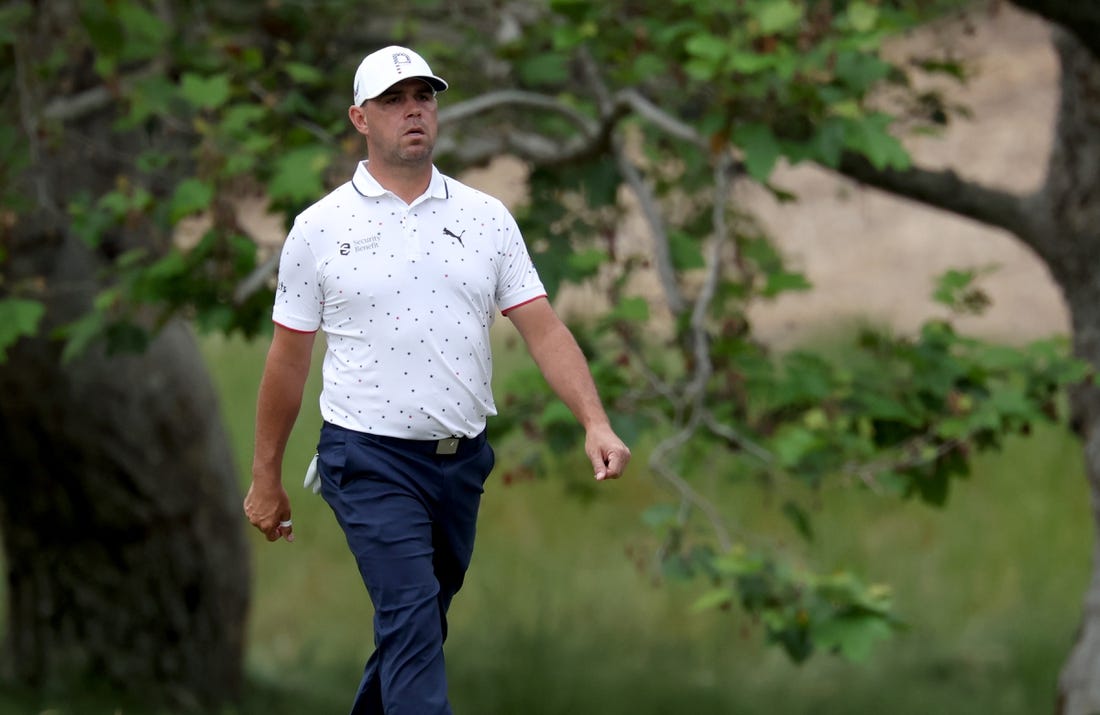Gary Woodland dealt with loss of appetite and energy, jolting awake in the middle of the night, tremors and an overwhelming feeling of fear until doctors could figure out what was wrong.
A benign lesion resting on his brain had to be removed before Woodland could feel like himself again. Less than four months after undergoing brain surgery, the 2019 U.S. Open champion is ready to make his inspirational return to professional golf this week at the Sony Open in Hawaii.
“It’s been a long process. One (that) maybe even a couple weeks ago I didn’t know if this week was possible,” Woodland told reporters Tuesday. “It’s been a journey for me, too, but this was a goal of mine from surgery to be back.”
The 39-year-old said his symptoms began in late April, and he thought they could be related to panic attacks. He had his first MRI May 24; specialists soon found the lesion and said Woodland’s jolting were partial seizures.
“The lesion in my brain sat on the part of my brain that controls fear and anxiety,” Woodland said. “(The specialist) is like, ‘You’re not going crazy. Everything you’re experiencing is common and normal for where this thing is sitting in your brain.'”
The initial course of action was medication, and the first dose was not large enough. Woodland said he began losing memories and had “horrible side effects” from the medicine.
Throughout that time, Woodland kept playing on the PGA Tour. He was making cuts, far more than the previous season, and after all, it gave him a break from thinking about his off-the-course struggles. But his symptoms found their way into his golf game, too.
“I would be standing over a club and forget which club I’m hitting,” he said. “I would be lining up putts and think, ‘This is taking too long. I’m just going to hit it.’ Didn’t have the focus or the energy.”
Woodland played through the Wyndham Championship in early August before his caddie took him aside and told him he needed to “get fixed.”
The lesion, which Woodland said was up against his optic tract, could not be fully removed without risking loss of eyesight. Instead, surgeons removed as much as they could.
Post-surgery, he feels like a new man.
“When I woke up and was realized I was OK, I was filled with thankfulness and love,” Woodland said. “That replaced the fear.
“It was very emotional because I had gone 4 1/2 months of every day really thinking I was going to die. The doctors kept telling me I was OK, but this thing pushing on my brain, fear and anxiety every — didn’t matter if I was driving a car, on an airplane, I thought everything was going to kill me.”
Now Woodland will continue to take medicine and receive MRIs to monitor the lesion and make sure it doesn’t grow.
Woodland was back to hitting balls five weeks later. He feels he can hit any shot he’d like. His surgeon advised him he wouldn’t want to compete for a while as he regains his mental focus.
“I can go out and do it for a day or two,” Woodland said. “Can I do it seven days this week? We’ll find out this week.”
Woodland hasn’t won on tour since that lone major title in June 2019. He said that before his symptoms began, his only fear was the fear of failure, of not being a great golfer. Now he can get back to that journey with a new outlook on life.
“At the end of the day, I just want to prove you can do hard things,” Woodland said. “I want to prove to my kids nobody is going to tell you you can’t do anything. You can overcome tough, scary decisions in your life. Not everything is easy. This came out of nowhere for me, but I’m not going to let it stop me.
“I don’t want this to be a bump in the road for me. I want it to be a jump start in my career. I’ve had people reach out that of gone through similar experiences, and hearing their recovery and dealing with similar things has definitely helped. Talked to athletes that have gone through concussions and protocols, because that’s some of the similar stuff I’ll be dealing with going forward.
“Nothing is going to stop me. I believe that. I believe a lot of great things are ahead.”
–Field Level Media

